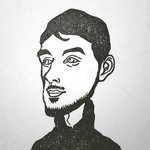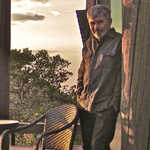Saw the Robert Montgomery solo exhibition at C24 in Chelsea. It’s tough to face “here comes the boom and end of your civilisation” and not be struck by its timeliness given everything in Washington. The show ends this week, and so does the Montgomery exhibition.
The work, in a word: haunting. Poetry in the form of billboards, lighted signs, letters cut from wood; installations in empty plazas and empty stadiums and empty swimming pools, as though sent back through the tunnel from post-apocalypse. An unironic Ozymandias—no, more like the seer in rags who tries to warn the king of his follies. There are castles and churches and there are no people in them. The high towers echo with voices. The poems seem anonymous, as though erected by a committee or scrawled in graffiti over a smiling face on a billboard for low-fat yogurt. They are both of this time and divorced from it.
Montgomery’s work is about an insidious oppression, as pervasive as the air around us, grown—growing—ever more toxic, responsible for “the slow disappearance of meaning and truth.” It’s “the cabriolet edition of capitalism.” It’s “the traditional names of objects repeated by television presenters.” It’s “things you keep to scaffold your narrative identity, so you never relax into the embarrassing capture of happiness.” We as individuals are inseparable from it, are ourselves both completely responsible and not responsible at all: “It turned out this way cos you dreamed it this way, cos all you could dream is what you saw in magazines, and this is how it feels to win, and have everything, all the luxury and power you ever wanted and still feel disgusted.”
Oof. My magazines tell me I need a drink.
For all its reproach and seeming resignation, Montgomery’s work is tender with the hope of fallow urbanity. Of resettlement, elsewhere: “There are wooden houses on land in faraway places, that don’t cost much money, and strings of lights that make paths to them gently and do not turn off the stars … There will be a quick sickness, the kind that kills the body before the mind knows, then there will be a slow rising.”
But there is, beneath the seeming resignation, also some new shape of rebellion. When oppression has metastasized, rebellion must also shift forms, adopt new tactics. And perhaps those best equipped to fight on these fronts are the poets, like Montgomery, whose weapons are the right words, in the right place and light, at the right time.
Filed Under
Other moments in New York
-
Espressoing
in New York, United States -
A few more days
in New York, United States -
Goodbye
A final Hi meeting
in New York, United States -
meditation, Creativity
The local neighborhood bar has a quiet time between six and nine. It is a place that specializes in coffee, beer and seasonal menus. There is just enough of each for a satisfying snack and effective buzz. After the time when the laptop lids close and before the social gatherings start -- there is a sort of twilight*. Often this time is a fugitive ground rife with creative inspiration and meditative work -- of the kind that results in personal reward.*twilight may refer to civil, nautical or astronomical variety depending on your social or terrestrial condition
in New York, United States -
Web, development
A man positions his mouse on the edge of his browser window. He clicks, holds and drags the viewport first left then right. The content of a video game promo micro site responds and adapts to the available space. To the man, this is more delightful than the game itself.
in New York, United States -
subway, music
A man laboriously moves his piano down three levels onto the subway platform. Classic vocals and strided chords -- he played so well I swore he was blind. Oblivious to the heat on that August stage, he was most in touch with his audience -- whom he elevated with his music.
in New York, United States -
Feminism
A woman should do exactly as she pleases no matter what a man may think.
in New York, United States -
Travel
As the Dalai Lama once said, "It is a time when there is much in the window, but nothing in the room."
in New York, United States -
stars, Grandma, Love
"No one understands me," she said. Her grandmother was silent for a minute. It seemed she was searching for an answer in the star speckled sky. "But no one understands anyone in this world, darling. We are all unique. It is what gives us a sense of wonder."
in New York, United States










